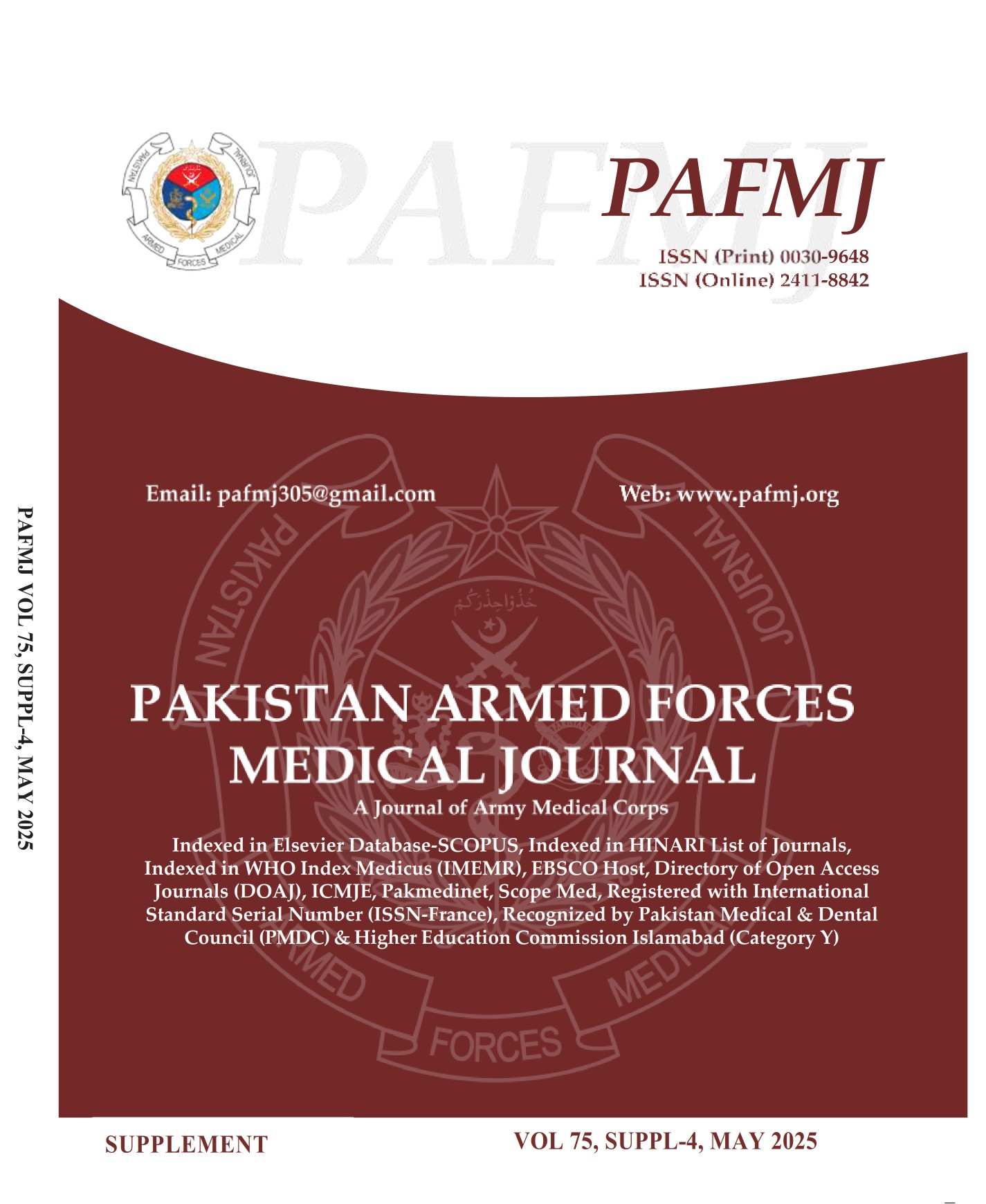Patients’ Perspective regarding Counselling about Hepatitis C Transmission: A Mixed Method Study in Rawalpindi, Pakistan
DOI:
https://doi.org/10.51253/pafmj.v75iSUPPL-4.10032Keywords:
Counselling, Hepatitis C, Health Education, Modes of Transmission.Abstract
Objective: To identify patient’s perceptions regarding counselling by health care workers about modes of transmission of Hepatitis C and to explore barriers to counselling.
Study Design: Mixed method study.
Place and Duration of Study: Outpatient and Inpatient of Medical, Surgical, Gynaecology, and Pre-Anaesthesia Departments of Tertiary Care Hospital, Rawalpindi Pakistan, from Aug 2019 to Feb 2020.
Methodology: After rigorous inclusion and exclusion criteria, 400 patients were selected for the study through consecutive sampling. After taking IRB an interviewer-administered structured questionnaire was used to determine the level of counselling, and two focus group discussions were conducted to explore the patient’s perspective regarding barriers to counselling.
Results: The results show that 56.5% (n=226) patients perceived the level of counselling to be poor, 34.3% (n=137) found it to be satisfactory, and a mere 9.3% (n=37) perceived it to be good. Barriers to counselling were attitude, time, attention given by health care providers, the environment, monetary issues, and a lack of communication skills and professionalism.
Conclusion: The majority of the respondents reported that the level of counselling regarding the modes of transmission of HCV was poor. Moreover, the lack of attention, time, and attitude of the health care professionals were considered significant barriers to counselling.
Downloads
References
Samsunder N, Ngcapu S, Lewis L, Baxter C, Cawood C, Khanyile D, et al. Seroprevalence of hepatitis B virus: Findings from a population-based household survey in KwaZulu-Natal, South Africa. Int J Infect Dis 2019; 85: 150-157.
https://doi.org/10.1016/j.ijid.2019.06.005
Ahsan A, Khan AZ, Javed H, Mirza S, Chaudhary SU, Shahzad-Ul-Hussan S. Estimation of hepatitis C prevalence in the Punjab province of Pakistan: A retrospective study on general population. PLoS One 2019; 14(4): e0214435.
https://doi.org/10.1371/journal.pone.0214435
Mahmud S, Al Kanaani Z, Abu-Raddad LJ. Characterization of the hepatitis C virus epidemic in Pakistan. BMC Infect Dis 2019; 19(1): 809. https://doi.org/10.1186/s12879-019-4403-7
Sood A, Midha V, Halli SS, Narang V, Mahajan R, Mehta V, et al. Impact of" Sambhav" Program (Financial Assistance and Counselor Services) on Hepatitis C Pegylated Interferon Alpha Treatment Initiation in India. Int J Health Policy Manag 2018; 7(12): 1138. https://doi.org/10.15171/ijhpm.2018.84
Odenwald MA, Paul S. Viral hepatitis: Past, present, and future. World J Gastroenterol 2022; 28(14): 1405–1429.
https://doi.org/10.3748/wjg.v28.i14.1405
Chhatwal J, Chen Q, Wang X. Assessment of the Feasibility and Cost of Hepatitis C Elimination in Pakistan. JAMA Netw Open. 2019; 2(5): e193613.
https://doi.org/10.1001/jamanetworkopen.2019.3613
Akgungor S, Alaei K, Chao W-F, Harrington A, Alaei A. Correlation between human rights promotion and health protection: A cross country analysis. Int J Human Rights Healthcare 2019; 13(1): 72–92.
https://doi.org/10.1136/bmjopen-2017-021350
World Health Organization. WHO urges countries to invest in eliminating hepatitis Report; 2019.
Moin A, Fatima H, Qadir TF. Tackling hepatitis C—Pakistan's road to success. Lancet 2018; 391(10123): 834-635.
https://doi.org/10.1016/s0140-6736(18)30462-8
Zafar U, Ammar Hasan BA, Khalid Z, Baig MU, Akram S. The Frequency of Hepatitis C and its Risk Factors Among Health Care Providers at Tehsil Headquarter Hospital, Hasilpur, Pakistan. Cureus 2018; 10(8): 3176. https://doi.org/10.7759/cureus.3176
Anjum MM, Abdul-Maik MH, Rizwan M, Saleem R, Khalid F. A KAP study of hepatitis among hepatitis positive patients presenting to a tertiary care hospital in Southern Punjab, Pakistan. Pak J Med Health Sci 2022; 16(9): 288–291.
https://doi.org/10.3889/oamjms.2019.118
Mustafa RE, Mushtaq S, Akhtar N, Yameen MA. Assessment of knowledge, attitude and practice towards hepatitis among patients visiting the hepatitis clinic in tertiary care hospital, Rawalpindi, Pakistan. J Pak Med Assoc 2019; 69(8): 1136-1141.
Seerat I, Mushtaq H, Rafiq M, Nadir A. Frequency and Associated Risk Factors of Hepatitis B Virus and Hepatitis C Virus Infections in Children at a Hepatitis Prevention and Treatment Clinic in Lahore, Pakistan. Cureus 2020; 12(5): e7926.
https://doi.org/10.7759/cureus.7926
Sherbuk J, Tabackman A, McManus KA, Knick T, Flickinger TE, Dillingham R. Patient perceptions of Hepatitis C among those failing to pursue treatment: A qualitative study of barriers and facilitators to care. 2020. Harm Reduct J 2020; 17(1): 64.
https://doi.org/10.1186/s12954-020-00409-9
Sutherns T, Olivier J. Mapping the multiple health system responsiveness mechanisms in one local health system: A scoping review of the Western Cape Provincial Health System of South Africa. Int J Health Policy Manag 2022; 11(1): 67-79.
https://doi.org/10.34172/ijhpm.2021.85
Yakob B, Ncama BP. Measuring health system responsiveness at facility level in Ethiopia: performance, correlates and implications. BMC Health Serv Res 2017; 17(1): 263.
https://doi.org/10.1186/s12913-017-2224-1
Sardar T, Khan IA, Khan MA. Patients satisfaction about health care delivery in out-patients department of combined military hospital rawalpindi. Pak Armed Forces Med J 2020; 70(6): 1929–1934.
https://doi.org/10.51253/pafmj.v70i6.5850
Khan SA, Murtaza G, Asad S. Patient Satisfaction Through Social Health Insurance: A descriptive cross sectional study. Int J Perceptions Pub Health 2019; 3(4): 94-103.
https://doi.org/10.1108/IJHRH-03-2024-0019
Gharaee H, Dewey RS, Jahanian R, Ebrahimoghli R, Tapak L, Hamidi Y. The effect of Health Evolution Plan on Health System Responsiveness: An experience of health system reform from Iran. Hospital Topics 2020: 1–11.
https://doi.org/10.1080/00185868.2020.1859342
Alshammari M, Duff J, Guilhermino M. Adult patient communication experiences with nurses in cancer care settings: a qualitative study. BMC Nurs 2022; 21: 63-67.
Downloads
Published
Issue
Section
License
Copyright (c) 2025 Nimbal Imtiaz, Abid Khan, Humaira Mahmood, Sadaf Riaz, Shazia Mahmood Awan, Zahir Ud Din Babar

This work is licensed under a Creative Commons Attribution-NonCommercial 4.0 International License.















